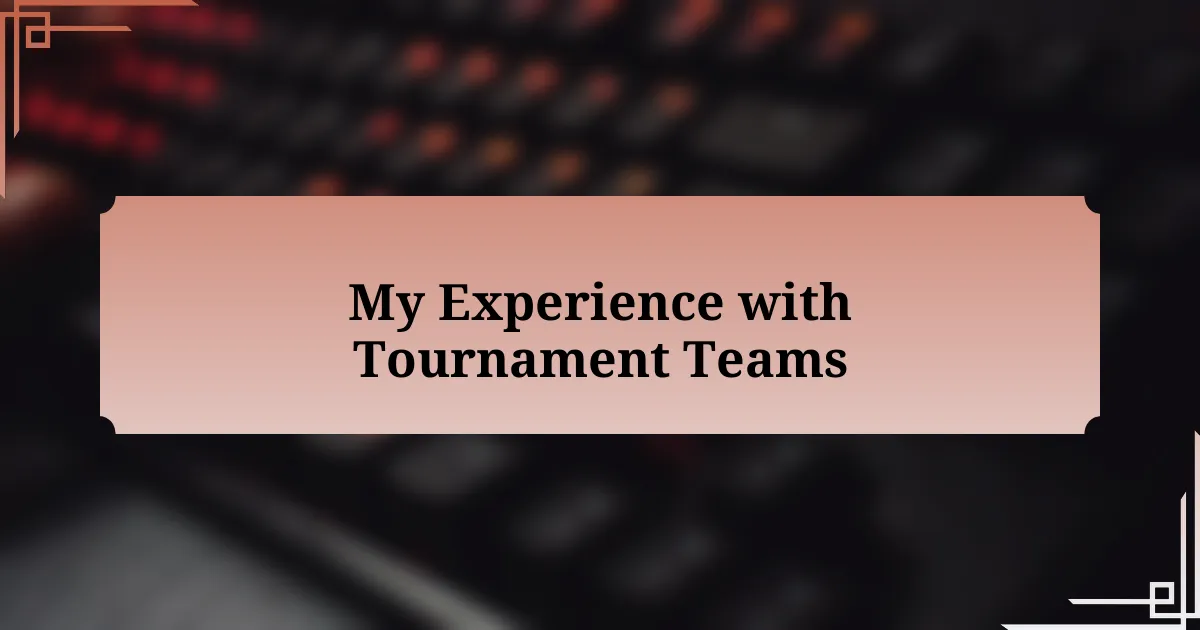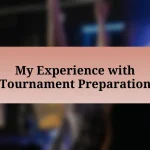Key takeaways:
- eSports fosters a strong sense of community and belonging among players and fans.
- Effective communication and teamwork are crucial for success in tournaments, helping teams to adapt and thrive under pressure.
- Maintaining mental resilience and celebrating small victories strengthens team dynamics and morale.
- Addressing conflicts early and fostering transparent communication can prevent larger issues and enhance team cohesion.
Author: Evelyn Hartley
Bio: Evelyn Hartley is an award-winning author known for her compelling narratives and richly drawn characters. With a background in psychology and literature, she weaves intricate tales that explore the complexities of human relationships and the intricacies of the human psyche. Her debut novel, “Whispers in the Dark,” was celebrated by critics and readers alike, earning her a dedicated following. Evelyn’s work has been featured in various literary journals and anthologies, and she frequently speaks at writing conferences and workshops. When she’s not writing, she enjoys hiking in the mountains and volunteering at her local animal shelter. She resides in Seattle with her two rescue dogs, Luna and Milo.
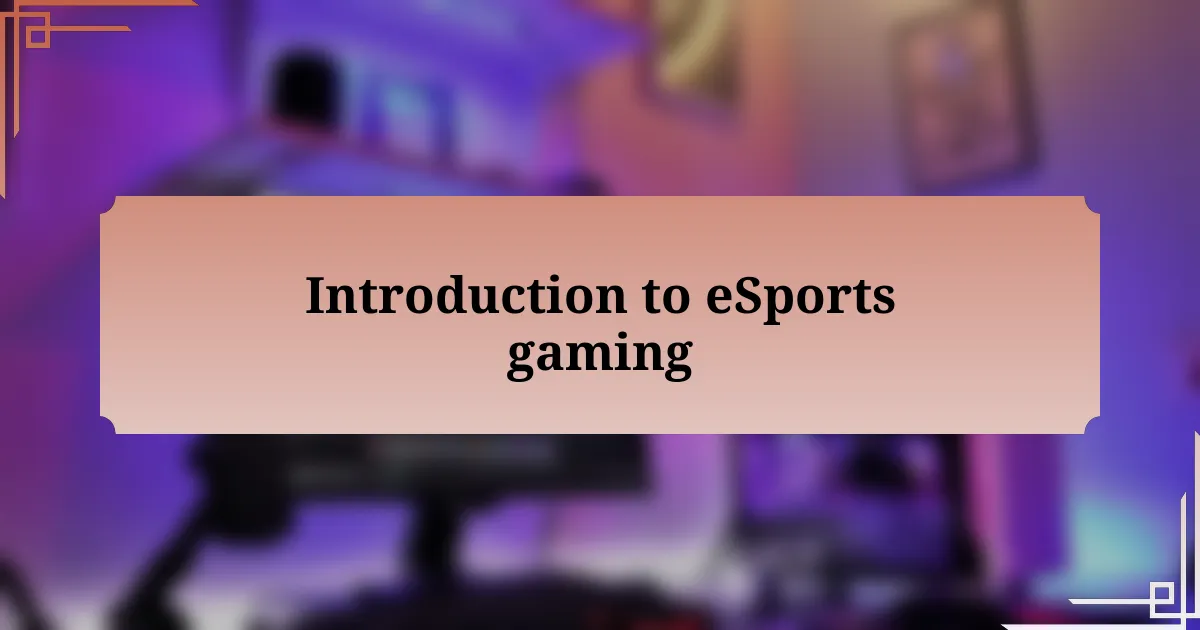
Introduction to eSports gaming
eSports gaming has transformed from a niche hobby into a global phenomenon, captivating millions of players and fans alike. I still remember the first time I watched an eSports tournament; the atmosphere was electric, and I felt an immediate connection to the passion of the gamers on screen. Isn’t it fascinating how something as simple as playing video games can evoke such intense emotions and community spirit?
The competitive nature of eSports mirrors traditional sports in many ways, yet it carries its unique flavor. I often find myself drawn to the rapid pace and strategic depth of games like League of Legends or Dota 2. What makes these games so compelling? It’s the blend of individual skill and teamwork that keeps me on the edge of my seat, and I’m sure many of you feel the same way.
With tournaments offering substantial prizes and the thrill of live audiences, eSports has created a vibrant culture that celebrates both competition and camaraderie. I recall my excitement during a local tournament, where the energy in the room was palpable, and we were all rooting for our favorite teams. We were not just spectators; we were a part of something larger, a community united by our love for gaming. Isn’t that sense of belonging one of the most powerful aspects of eSports?
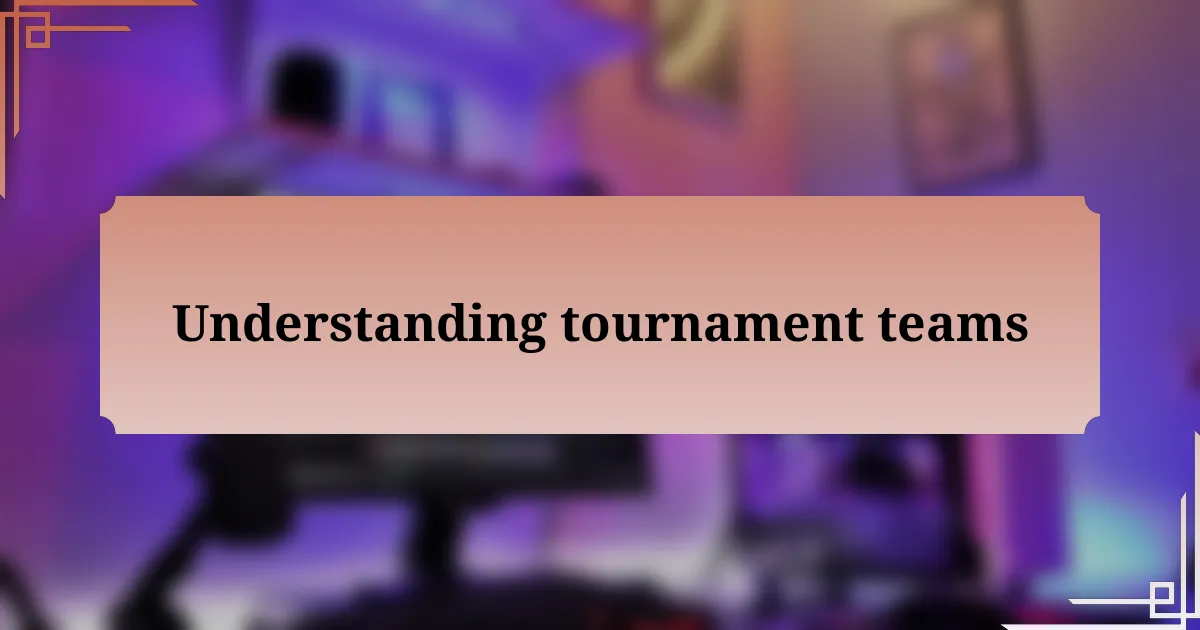
Understanding tournament teams
Tournament teams in eSports are more than just groups of players; they embody a shared vision and goal. I still vividly remember the early days of forming my first competitive team. The thrill of selecting teammates who complement each other’s strengths and weaknesses was exhilarating. Have you ever built a team where each member brings a unique skill set? It’s like crafting a puzzle where every piece matters.
Understanding the dynamics within a tournament team is crucial. Communication becomes the lifeblood of collaboration, especially during high-pressure situations in-game. I recall a tense moment in a match where clear, calm calls from our captain turned the tide in our favor. When everyone is aligned and trusts each other, it feels as if we can conquer any challenge together.
The bond formed within a tournament team often extends beyond the virtual battlefield. I find that celebrating victories, as well as reflecting on losses, solidifies friendships. Have you experienced that feeling of camaraderie after a hard-fought battle? It’s in those moments of shared triumphs and setbacks that we truly grow, both as players and individuals.
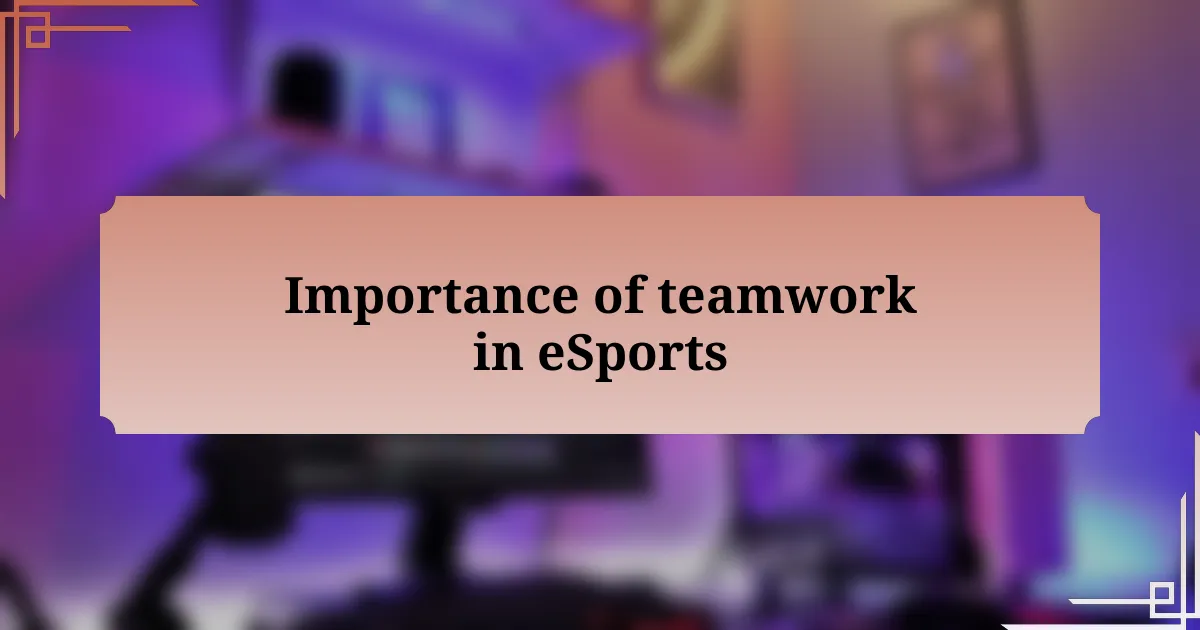
Importance of teamwork in eSports
Effective teamwork in eSports is essential for achieving success, especially during tournaments. I remember one specific match where my team’s synergy was put to the test. We were against a formidable opponent, and instead of panicking, we relied on each other’s strengths to coordinate our strategies. It was uplifting to see how our collective efforts led to a stunning comeback, illustrating the power of teamwork.
Communication, I’ve found, is the cornerstone of any successful team. During one intense tournament, we established a system of signals to convey strategies quickly. It felt like we were speaking a language only we understood, which reduced confusion and boosted our confidence. How often do you think in-game communication can determine a match’s outcome? In my experience, it’s not just about calling plays; it’s about building trust, ensuring everyone feels valued, and knowing we had one another’s backs.
Beyond gameplay, the emotional support that stems from teamwork is invaluable. After a crushing defeat in a high-stakes tournament, we regrouped to debrief and share our feelings. Instead of casting blame, we celebrated the effort and resilience each team member demonstrated. Have you ever bonded with teammates over shared disappointments? Those moments of vulnerability not only strengthen relationships but also foster a deeper commitment to one another and the team’s future success.
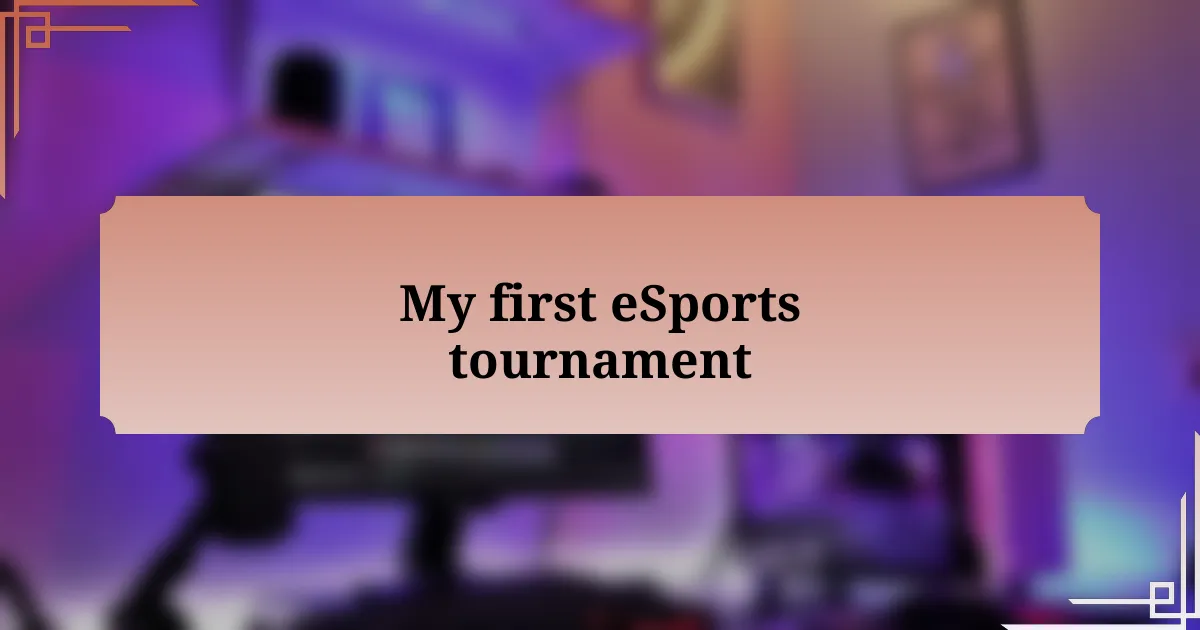
My first eSports tournament
My first eSports tournament was nerve-wracking yet exhilarating. Stepping onto that stage, surrounded by flashing lights and the cheers of the crowd, I could feel my heart racing. I remember glancing at my teammates, sharing that silent understanding of what we were about to face, and realizing how much our preparation had brought us together.
As the matches progressed, I vividly recall the moment we lost our first game. It felt like the ground had shifted beneath us. I was devastated but also surprised at how my teammates rallied around me. They encouraged me to refocus, reminding me that one loss didn’t define us. Have you ever experienced the rush of emotions in a competitive setting? That moment shifted my perspective on the tournament; it wasn’t just about winning but also about learning and growing together.
By the final match, we had transformed our initial nerves into a powerful energy. I felt an overwhelming sense of pride for what we had accomplished collectively. While we didn’t take home the trophy, the friendships and memories formed that day were the real victory. Isn’t that what eSports is truly about—a blend of competition, camaraderie, and unforgettable experiences?
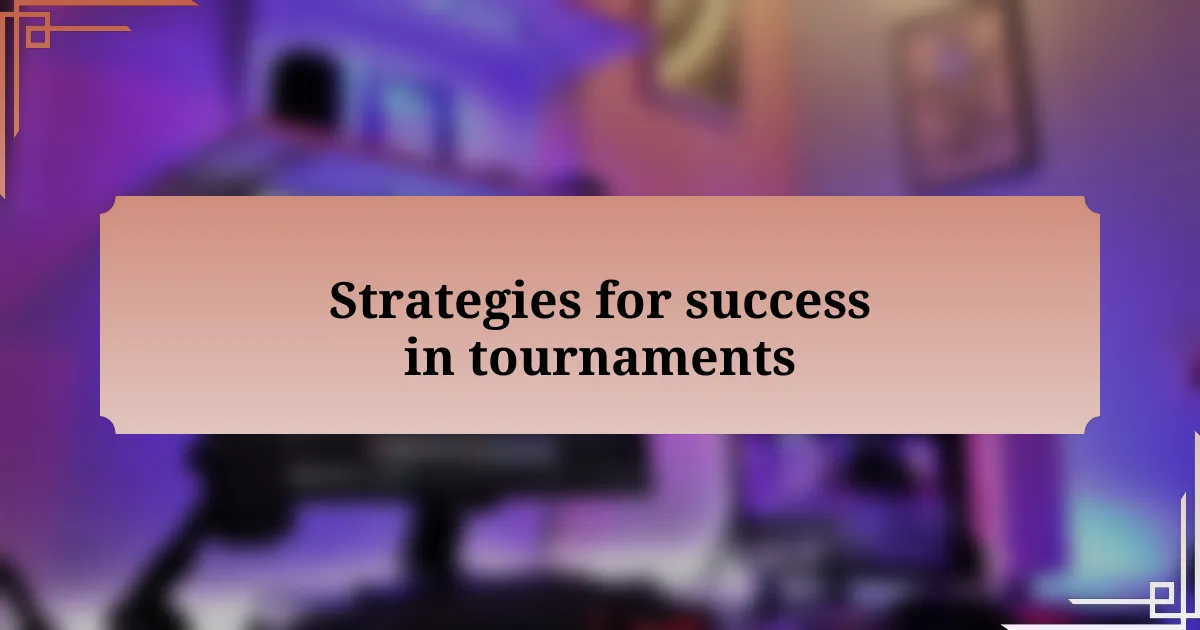
Strategies for success in tournaments
One of the most effective strategies for tournament success is maintaining open communication with your team. I remember during my second tournament, we established a habit of discussing our in-game strategies and adjustments in real-time. This allowed us to adapt quickly to our opponents’ tactics. Have you ever faced a team that seemed to anticipate your every move? Our ability to share observations made the difference when countering their plays.
Another crucial aspect is fostering mental resilience. In a pivotal match, we found ourselves down by several points, and the pressure was immense. Instead of succumbing to frustration, we focused on positive reinforcement, encouraging one another to stay calm and composure. This shift in mindset transformed our gameplay, showcasing that mental strength can be just as impactful as skills. Can you recall a moment when staying positive turned a situation around?
Lastly, practicing together consistently is non-negotiable. I once joined a team that met daily for scrimmages, and the improvement was evident. We learned each other’s strengths and weaknesses, paving the way for seamless collaboration during games. Think about your own experiences—how often do you practice with your team? That commitment to regular practice not only sharpened our skills but also strengthened our bond, making us a more formidable force in the tournament.
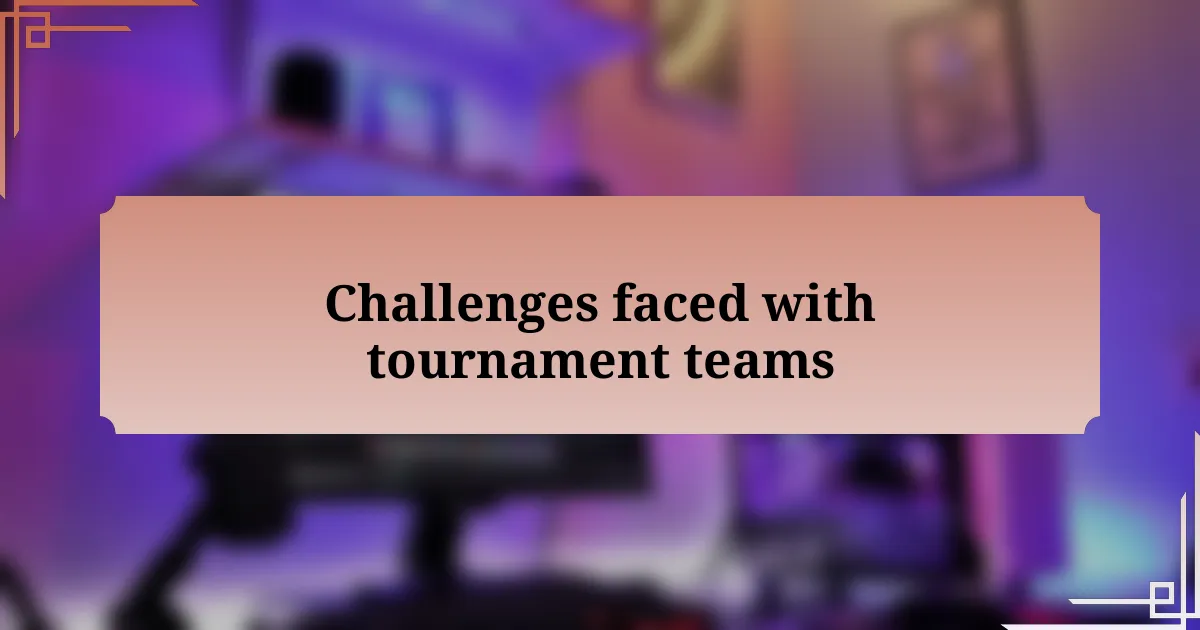
Challenges faced with tournament teams
The pressure to perform at tournaments can be daunting. I still remember the overwhelming anxiety before my first match, where the stakes felt impossibly high. That pressure can lead to burnout or poor decision-making. Have you ever felt like the weight of expectations was just too much? I certainly have, and it’s a challenge that every team member must navigate together to maintain peak performance.
Another major challenge we faced involved coordinating schedules for practice and matches. Finding a time that worked for everyone often felt like herding cats, and it tested our commitment to the team’s success. I’ve grown to appreciate that flexibility and understanding in a team dynamic can often be just as important as skill. Have you ever had to compromise on a personal commitment to meet your team’s needs? It’s a delicate balance that can strain relationships if not handled well.
Lastly, team dynamics can be incredibly complex. Conflicts may arise from differing play styles or personalities, and I’ve seen firsthand how a disagreement could fracture a team’s morale. I vividly recall a time when two teammates clashed over strategy and it created a tense atmosphere. I learned that addressing conflicts early with open discussions could prevent bigger issues down the line. How do you handle disagreements in your team? The ability to resolve these conflicts quickly is crucial for maintaining a cohesive unit, especially in high-stakes environments like tournaments.
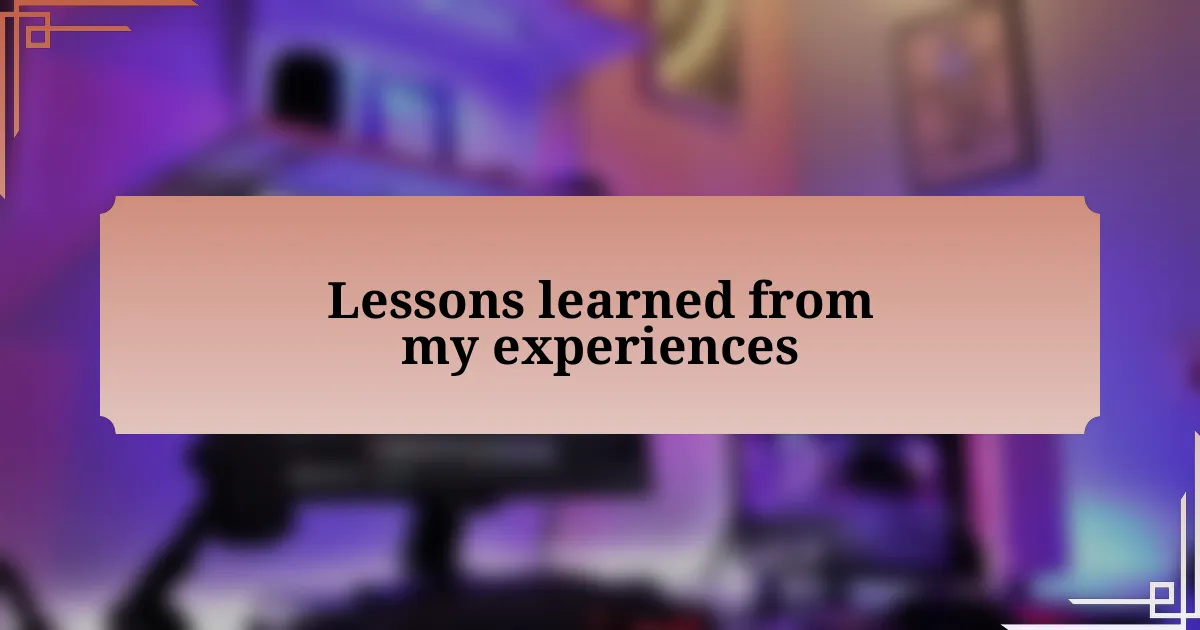
Lessons learned from my experiences
Through my journey with tournament teams, one key lesson is the importance of mental resilience. I’ve had moments where the pressure felt overwhelming, leading to self-doubt creeping in during critical matches. It taught me that mental clarity is just as vital as skill; taking a moment to breathe and refocus can turn a game around. Have you ever felt your mind racing when the stakes were high? Recognizing that mindset can make all the difference in those heated, pivotal moments.
Another significant takeaway has been the value of transparent communication. In one tournament, our team faced a rough patch due to unclear roles and expectations, and it left us scrambling. I remember how an honest conversation, where everyone was encouraged to voice their thoughts, helped us regain our footing. It’s a simple yet powerful lesson: foster an environment where team members feel comfortable speaking up. Have you experienced a breakthrough after a tough discussion? Those moments can redefine a team’s dynamic.
Lastly, I learned that celebrating small victories goes a long way in building team morale. During a challenging season, we made it a habit to acknowledge even the smallest achievements—like completing a practice session with focus or mastering a new strategy. I remember how much our spirits lifted when we celebrated those wins, reinforcing a sense of camaraderie and shared purpose. Do you take time to appreciate your team’s efforts? Embracing those moments can foster a positive atmosphere, ensuring everyone stays motivated for the challenges ahead.

